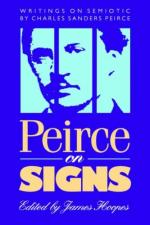|
This section contains 5,125 words (approx. 18 pages at 300 words per page) |

|
SOURCE: '"Vaguely Like a Man': The Theism of Charles S. Peirce," in God Knowable and Unknowable, edited by Robert J. Roth, S. J., Fordham University Press, 1973, pp. 241-54.
In the following essay, Potter presents a Jesuit's interpretation of Pence's "Neglected Argument for the Reality of God. "
Peirce's theism is not calculated to please many philosophers—at least not at first sight. His theism, he says, is "sound pragmatism," and this is not likely to attract positivists who have adopted its maxim as an expression of their own views concerning verification. His theism, he says, is a consequence of anthropomorphism—a claim not likely to delight either traditional theists or hardheaded scientists. Finally, his theism is intrinsically infected with vagueness, a disease which surely will be diagnosed as fatal by many analysts and logicians. We have failed to remark perhaps the most disturbing claim of all: Peirce's theism...
|
This section contains 5,125 words (approx. 18 pages at 300 words per page) |

|


